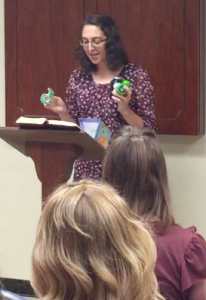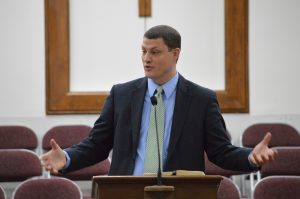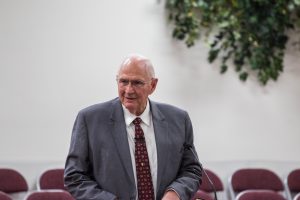Family Fellowship Week is about more than just preaching! Our desire is for it to be a place of fellowship where we can feed your soul, familiarize you with our staff, and allow you to focus on our commitments to each other. Two of our board members’ wives spoke to the ladies, and our Director of Deputation spoke on ministry families. Below are notes and links for these practical sessions. We have also included links for Principles and Practices, as well as the Q&A time.
Each message below contains links to the audio via our Uplift podcast site. In order for the direct links to work, you must be logged in with the username: wwntbm and the password: gospel.
Bloom Where You Are Planted – A Lesson of Fruitfulness
Karen Daniel
Sometimes we think we are being buried when we are really being planted. God must plant us so we can grow, bloom, and bear fruit. Plants start as seeds that are dormant; we too are dead without Christ, but salvation brings new life. Just as a pl ant needs roots we need a foundation. Seedlings are tender and need to be watched carefully, so new Christians need us to be sensitive to their needs as they are being transformed. When the plant reaches the blooming stage it begins to bear fruit. We as Christians must bloom with grace. Our fruit comes from Him, not us, and we must not take pride in what Christ does through us. Remember that God made a variety of plants and has made a variety of people as well. Variety gives beauty. Do not try to be someone else. Fake flowers may appear beautiful but they never change, and they never bear fruit. Plants need nourishment to flourish. The Bible is our spiritual ‘miracle-grow.’ Without it, we may think we are ok, but we will never flourish. The flourishing plant draws the attention of passers-by, and the fruit of the spirit blooming in our lives draws others to Christ. Plants may have good or bad aromas, and our attitudes should radiate a sweetness to others. Crushed plants provide ointments. Trials in our life bring the balm of Christ to our souls. Plants can be re-potted, and sometimes in our lives, Christ moves us to a new location. We must bloom where He plants us, so the beauty and fragrance of our lives will draw others to Christ.
ant needs roots we need a foundation. Seedlings are tender and need to be watched carefully, so new Christians need us to be sensitive to their needs as they are being transformed. When the plant reaches the blooming stage it begins to bear fruit. We as Christians must bloom with grace. Our fruit comes from Him, not us, and we must not take pride in what Christ does through us. Remember that God made a variety of plants and has made a variety of people as well. Variety gives beauty. Do not try to be someone else. Fake flowers may appear beautiful but they never change, and they never bear fruit. Plants need nourishment to flourish. The Bible is our spiritual ‘miracle-grow.’ Without it, we may think we are ok, but we will never flourish. The flourishing plant draws the attention of passers-by, and the fruit of the spirit blooming in our lives draws others to Christ. Plants may have good or bad aromas, and our attitudes should radiate a sweetness to others. Crushed plants provide ointments. Trials in our life bring the balm of Christ to our souls. Plants can be re-potted, and sometimes in our lives, Christ moves us to a new location. We must bloom where He plants us, so the beauty and fragrance of our lives will draw others to Christ.
Sticking To It – A Lesson of Faithfulness
Becky Estep
 God’s faithfulness is foundational to all of His promises. Since He is always faithful, we too must be faithful to stick with it as a testimony to others. We should pray to be faithful, realizing the devil fights against our faithfulness. Look at the big picture. God already sees the end. To be faithful over decades, you must start early. Write down your decisions so you don’t forget them! Expect change, not in doctrine or beliefs, but in life circumstances. It requires adaptability and a realistic outlook on life to be faithful through changes. Don’t make major decisions in low times. Low seasons bring a change in perspective. Allow Christ to patiently work in you the change he desires in the low times, before making a decision to move from this place. Hold fast to his promises and trust for his outcome. Realize that trials come to everyone and in all locations. Seek counsel. Talk with others and read a variety of perspectives. In a multitude of counselors, there is safety and security. Give thanks in everything. Gratitude affects your attitude. When you realize all God has done for you, you can’t help but desire to be faithful to him. God has a specific job for you and you are the only one who can fill it. Every person is faithful to something. The problem is the object of our faithfulness. Faithfulness doesn’t happen by accident. Faithfulness results in encouragement and security.
God’s faithfulness is foundational to all of His promises. Since He is always faithful, we too must be faithful to stick with it as a testimony to others. We should pray to be faithful, realizing the devil fights against our faithfulness. Look at the big picture. God already sees the end. To be faithful over decades, you must start early. Write down your decisions so you don’t forget them! Expect change, not in doctrine or beliefs, but in life circumstances. It requires adaptability and a realistic outlook on life to be faithful through changes. Don’t make major decisions in low times. Low seasons bring a change in perspective. Allow Christ to patiently work in you the change he desires in the low times, before making a decision to move from this place. Hold fast to his promises and trust for his outcome. Realize that trials come to everyone and in all locations. Seek counsel. Talk with others and read a variety of perspectives. In a multitude of counselors, there is safety and security. Give thanks in everything. Gratitude affects your attitude. When you realize all God has done for you, you can’t help but desire to be faithful to him. God has a specific job for you and you are the only one who can fill it. Every person is faithful to something. The problem is the object of our faithfulness. Faithfulness doesn’t happen by accident. Faithfulness results in encouragement and security.
Ministry Families
Jeremy Lockhart
 This session covered lessons the Lockharts have learned during their deputation, field, and furlough ministries, as well as during changes in ministry.
This session covered lessons the Lockharts have learned during their deputation, field, and furlough ministries, as well as during changes in ministry.
1 – Be yourself. What you do to gain support is what you will have to do to keep it. Be genuine.
2 – Teach your kids to obey, but don’t be too harsh. Don’t provoke them to anger by expecting them to act like adults. Don’t make bad scheduling decisions and sacrifice your family to meet your goals, then discipline them for something that was your fault when you should have given them time to be rested.
3 – Deputation is a time of ministry. It is an opportunity to speak in churches where the pastor has often never met you! Don’t squander the time thinking only of raising funds. Deputation is a time to expose the church to missions and to burden the hearts of the next generation of missionaries.
4 – Let no man despise your youth. You don’t have the same perspective but you do have influence. Often young folks look to the generation immediately above them for inspiration, not to generations several years older. Your youth will energize and encourage the church.
5 – Don’t be lifted up in pride. You don’t know it all.
6 – Deputation is a time to develop relationships. Learn to humble yourselves to receive gifts from others. Be a friend to those you meet along the way.
7 – Relationships are important. Spend time with people. Love them. Learn from them. Ask questions. Learn to dialogue and find out what people understand from what you tell them. Study the list of questions Christ asked of individuals; He was always seeking to find their understanding and perspective of the situation.
Principles and Practices
Bill Wingard and Danny Whetstone
 Each year at Family Week, we review the principles and practices that define our missions agency. We do this to remind ourselves of where we came from and what we stand for and to ensure that we will not change our principles as we move into the future.
Each year at Family Week, we review the principles and practices that define our missions agency. We do this to remind ourselves of where we came from and what we stand for and to ensure that we will not change our principles as we move into the future.
Click here to listen to Part 1 with Bill Wingard.
Click here to listen to Part 2 with Danny Whetstone.
Questions and Answers
John O’Malley and Danny Whetstone
 Missionaries in attendance were asked to submit questions to our staff. Topics ranged from ministries to families, and from theological to practical matters. Click here to listen to this informative session.
Missionaries in attendance were asked to submit questions to our staff. Topics ranged from ministries to families, and from theological to practical matters. Click here to listen to this informative session.
